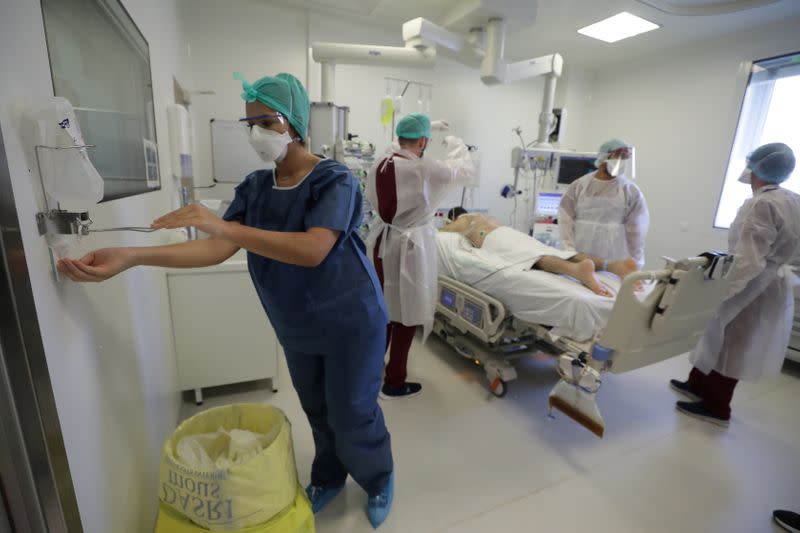What you need to know about the coronavirus right now
(Reuters) - Here's what you need to know about the coronavirus right now:
French daily infections at record high
France recorded almost 10,000 new COVID-19 infections on Thursday, its highest single-day total, a day before a cabinet meeting that might consider imposing fresh, local lockdowns to curb the spread of the disease.
Health authorities reported 9,843 new confirmed coronavirus cases, beating by almost 900 the previous record of 8,975, set six days earlier.
Since the beginning of the month, new cases have gone up by 7,292 each day on average, a figure that blows away the previous record daily average of 3,003 seen in August.
France has the seventh-highest COVID-19 death toll in the world.
Coronavirus aid bill killed in U.S. Senate
The U.S. Senate on Thursday killed a Republican bill that would have provided around $300 billion in new coronavirus aid, as Democrats seeking far more funding prevented it from advancing.
House of Representatives Speaker Nancy Pelosi told reporters before the failed Senate vote on Thursday that she thought negotiations could still produce a compromise before the Nov. 3 presidential and congressional elections. But after the vote, several Republican senators were skeptical.
Congress is now expected to mainly focus its work on other pressing legislation so members can return to their home states in October to campaign for re-election.
U.S. cites Smithfield Foods for failing to protect workers
The U.S. Labor Department cited Smithfield Foods for failing to protect employees from the coronavirus, making it the first major meatpacker to face a fine after outbreaks at slaughterhouses infected thousands of workers.
The citation did little to quiet complaints from labor unions and safety advocates, who say the Trump administration needs to do more to protect workers critical to the nation's food supply.
The Labor Department's Occupational Safety and Health Administration cited Smithfield's plant in Sioux Falls, South Dakota, for "failing to provide a workplace free from recognized hazards that can cause death or serious harm," according to a statement.
At least 1,294 Smithfield workers contracted the coronavirus and four employees died this spring, OSHA said. The citation issued to the company said employees worked close to one another and were exposed to the virus.
Latin America passes 8 million cases
The coronavirus tally passed the 8 million mark on Thursday in Latin America, the region with the most infections in the world, although there were indications the virus was now spreading more slowly in some countries.
Over the past week, the daily average of cases in the region fell to 67,173 through Wednesday from 80,512 in the previous seven days, according to the Reuters tally, which is based on figures released by governments.
Brazil, experiencing the worst outbreak in the region, stayed atop the Latin American tables for coronavirus cases and deaths, recording a total of 4.2 million infections and more than 128,000 deaths.
Vaccine confidence volatile
Political polarisation and online misinformation are threatening vaccination programmes worldwide, with public trust volatile and varying widely between countries, according to a global vaccine confidence study.
The study, which maps trends in vaccine confidence across 149 countries between 2015 and 2019, found that scepticism about the safety of vaccines tended to grow alongside political instability and religious extremism.
"It is vital with new and emerging disease threats such as the COVID-19 pandemic, that we regularly monitor public attitudes," said Heidi Larson, a professor at the London school of Hygiene & Tropical Medicine who led the research.
"Perceptions about vaccines are much more volatile than they used to be," she told a briefing. "Overall, there's a lot of confidence in the world about vaccines. But don't take it for granted. Confidence goes up and down ... it's highly variable."
(Compiled by Linda Noakes; Editing by Toby Chopra)


